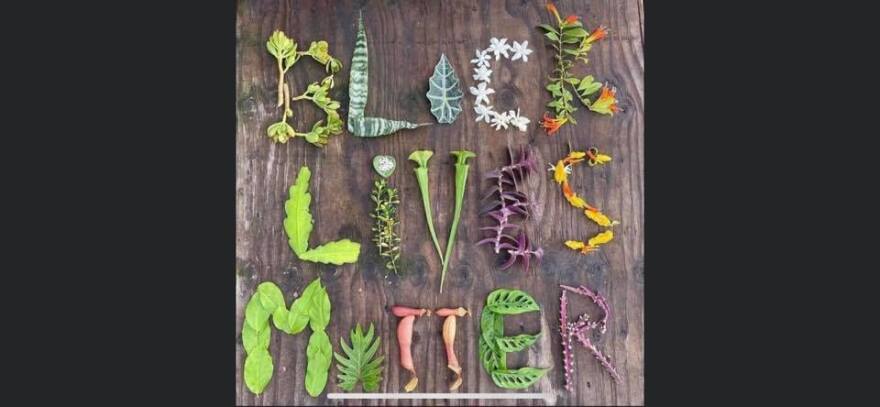For today's KSMU Sense of Community feature on "New Hobbies" taken up during the COVID pandemic, we'll hear from Kristen Schuler, who works as a behavioral health consultant and outpatient therapist for Burrell Behavioral Health in Springfield.
"I meet with people on a weekly or every other week basis,” she said, “to kind of talk through the challenges that they're going through. And a lot of that can have a pretty big impact on the therapist. So that's something that requires quite a bit of self-care on my end to work through. A lot of the techniques that I use at work and at home personally are based around mindfulness, and being able to find ways to be present in this current moment, versus in the future or back in the past."
Schuler says the COVID shutdown had quite an impact on her, both professionally and personally.
"Part of the week, I actually work in a primary care clinic, so it brought up a lot of changes with how we met with patients. And I actually for several months did therapy out of my bedroom closet. And so it changed a lot of how I had to set up to be able to do that privately from home, and also trying to keep some sort of a balance between work and home life during that time."
So how did she cope with the stress?
"I turned to houseplants as my way to practice mindfulness, and also as a way to safely stay social, because I did go from being a pretty social person and being able to be out and doing a lot of activities, to suddenly spending a lot more time at home than before and needed to find ways to do that."
Kristen Schuler already had an interest in cultivating house plants, but she says her efforts weren't always successful. "I've always had a little bit of an interest in gardening and plants, but most of it was, I spent a lot of time kind of watching plants as they died! I didn't have a lot of experience and didn't really understand much about the plants that I did own."
So she got involved with two local plant growing hobbyist groups, Queen City Plant Exchange, a Facebook group, and Springfield, Missouri House Plants.
"When I moved to Springfield, I met a couple of other friends who had an interest in plants and kind of decorating their homes with them,” she said. “And they had recommended a Facebook group, a local one that I got involved with, which led to another local one. And I just kind of found a community here in Springfield. It was a way to meet more people who maybe shared common interests."
Each group she mentioned has about two thousand members. They not only share their interest in and knowledge of plants, they actually swap house plants among themselves.
"It's interesting. I can take a look at any plant that I have in my house and just kind of imagine all of the different living environments it's been in, because it's probably passed through many homes in Springfield.” She described the plant-swapping protocol this way. “If there's a certain type of plant that you really want, maybe a different species that you're trying to get hold of, then you can put a call out to say that you're in search of it. And maybe there'll be somebody across town who has that plant that is taking up space and they're wanting to get rid of. And they may say, 'well, here's what I have to offer.' And you set a swap up."
Of course, getting together with fellow enthusiasts to trade house plants has been rather tricky due to COVID social distancing.
"Everything is virtual. Now, you will just post to the whole group kind of what you have to, as we call it, 'purge,' which means just kind of anything in your personal collection that you want to get rid of. But we do that all pretty publicly so that others can comment, maybe tag if somebody knows of someone else that's looking for something. And then we might send each other messages to coordinate a pickup. And we very much encourage doing that safely, whether that's porch drop-off or being able to swap from a distance, masked, things like that. We took a lot of precautions once we knew that it was safe to be able to do it in that way."
When she first began collecting plants, Schuler tried to acquire as many different species as possible. But as collectors often must do, she has begun to specialize a bit more, partly to reduce clutter. She said she often seeks to acquire “some harder to find, rare plants. “A lot of times what I'm looking for (is) more of cuttings. I like to rehab plants, so somebody may have one that's barely hanging on to life and I might try to give it a better living environment. I do not know how many plants I have right now. The last time that I was trying to see just how many different species, I know that I had over eighty-five. But that changes all the time because we're constantly swapping. So I may have something, get tired of it and then send it on down the road. So it's kind of ever-changing."
Kristen Schuler's lifestyle was fairly hectic before the pandemic. But now?
"There's nothing like being able to pace your days by seeing just how much your plant has grown,” she said. “It's just a different kind of appreciation for the passage of time."
Kirsten Shuler's almost four-year-old daughter has shown an interest in plants as well. And Schuller says she plans to stick with the hobby.
"I am excited for the opportunity that once we can do so safely, getting to meet some of these friends that I've made online.”


